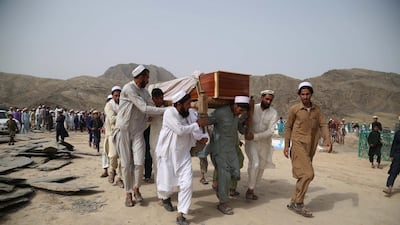This Eid Al Fitr has been an especially blessed one for the people of Afghanistan and Pakistan, thanks to some quid pro quo diplomacy between their governments.
The festivities saw a remarkable ceasefire between Nato-backed Afghan security forces and the Taliban. Social media feeds were filled with sights people thought they would never see. Top Afghan officials welcomed the Islamist insurgents visiting major cities, as well as their home towns and villages, to celebrate the holy festival. Foes embraced and prayed together. The public took selfies with the Taliban. It was an occasion to demonstrate a genuine desire for peace among Afghans.
Politically, the ceasefire was remarkable because it was backed by hardliners on both sides, who were eager to demonstrate unity of command. This was especially important in the context of a fast-unfolding resurgence of security co-operation between Afghanistan and Pakistan, following six months of discreetly conducted Chinese-led peacemaking efforts in South Asia.
Against this backdrop of hope, Afghan President Ashraf Ghani offered to extend the government’s unilateral ceasefire for an unspecified period and asked the Taliban to respond in kind. Although they refused to extend it beyond Sunday night, the sight of fighters and officials exchanging Eid greetings over three days was an extraordinary one.
The celebrations were marred by two suicide bombings, the first launched on an Eid gathering of Afghan soldiers and Taliban fighters by ISIS in response to the unanticipated bonhomie and the second killing 18 Eid revellers in Jalalabad on Sunday. A detente between Kabul and the Taliban would intensify the focus of multinational counter-terrorism operations on the bases of ISIS and its Tehreek-i-Taliban Pakistan (TTP) allies in eastern Nangarhar and Kunar provinces.
Pakistani pressure was critical to persuading the Taliban to soften its opposition to a compromise with Mr Ghani’s administration. He returned the favour by acting on intelligence provided by Pakistan’s army chief of staff, General Qamar Javed Bajwa, during talks in Kabul on June 13.
Within hours, US military drones had killed Mullah Fazlullah, the elusive TTP chief, as he drove away from an iftar dinner in Kunar. The death of Fazlullah was as much reason for celebration in Pakistan as the ceasefire in Afghanistan.
Although not the most powerful TTP chief, he was certainly the most reviled. In 2007, he seized Swat, Pakistan’s most popular summertime tourist destination. Under Fazlullah, its residents endured the kind of brutal totalitarianism now commonly associated with ISIS rule in parts of Iraq and Syria. He later earned global ignominy by ordering the 2012 shooting of Malala Yousafzai, the Nobel Peace Prize laureate, who was then a 14-year-old schoolgirl.
The capture of Swat established the TTP as an existential threat to Pakistan. It created a significant TTP stronghold inland from the remote tribal areas bordering eastern Afghanistan. From there, Fazlullah’s fighters probed further east towards defence installations believed to store some of Pakistan’s nuclear assets, ringing alarms bells across the country and around the world.
The subsequent decade-long war between the TTP and Pakistan’s armed forces displaced millions of people. Just a day before Fazlullah was killed, Pakistani authorities informed 3,200 families, displaced by the very last counter-terrorism operation of the conflict in the tribal areas, that they would be able to return to their homes in the Rajpal Valley of Khyber.
For them and the growing mass of Afghans displaced by war, much depends on what happens next between the authorities in Kabul and Islamabad, as well as within the Afghan and Pakistan Taliban movements.
Confirming the death of Fazlullah, Mr Ghani challenged Pakistan's military decision-makers to bring the top two Taliban leaders, allegedly resident on its soil, to the table. That is an ambitious ask for a host of reasons, including the loss of Pakistani deniability about their presence. And the Taliban has still not dropped its insistence that any talks should be held with the US because it is calling the shots in Afghanistan.
On the other hand, Kabul has delivered the top item on Pakistan’s security wishlist. A Taliban refusal to talk would further intensify US pressure on Pakistan, probably to the point of becoming economically unsustainable. In that event, it would carry out plans for the wholesale expulsion of the Taliban from Pakistan, along with the entire Afghan refugee population of 1.45 million.
The Taliban is also acutely aware it stands to lose its claim to political legitimacy if it does not respond positively. Despite the intensified conflict in Afghanistan since then, the Taliban's representatives have remained active in back channel diplomacy forums. They might agree to preliminary talks if a new process were to have even wider multilateral participation.
They would find common ground on the matter of the growing presence of ISIS in Afghanistan, an existing area of co-operation between the Taliban and five regional governments. Previously, ISIS and the TTP have operated as military allies in eastern Afghanistan since 2014. In addition to launching attacks on Pakistan, they have fought against Afghan, US and Taliban forces.
Following the assassination of Fazlullah, the two groups might attempt to revive their flagging fortunes, possibly under a formal political arrangement fronted by a new TTP chief.
The coming months will have a great bearing on the future of ISIS and the TTP in south Asia. They would also determine whether there is any real prospect of sustainable negotiation in Afghanistan. In both cases, the outcome would depend on the establishment of a trustworthy, multilateral diplomatic process to address the concerns of rival Afghan and foreign vested interests.
The alternative would be greater chaos in Afghanistan and greater spillover across the region.
Tom Hussain is a journalist and political analyst in Islamabad

